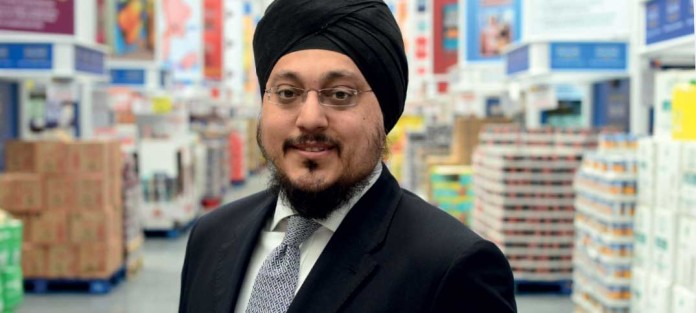When you consider the success that East End Foods is enjoying in Birmingham you really have to agree with Jason Wouhra, company director, when he says: “Retail businesses are becoming sexy again.”
And it’s easy to see why. Currently one of the top 250 fastest growing companies in the UK, East End Foods’ retail customers make up 90% of their customer base. It has a 45 year heritage of being reliable, approachable and honest, which continues to reap the rewards among its retail base. “There’s no ivory tower, we’re close to our customers. The power of the independent trade is far bigger than the likes of Tesco. If we organised ourselves we’d trump them all day long. People buy off people, it’s relationships that are important.” The business also currently caters for 800 foodservice outlets including takeaways, restaurants, hotels and bars.
Despite improving economic conditions retailers are now much savvier. East End’s customers now tend to buy much more regularly but have smaller baskets each time. “In the old days customers would take pallets and then we wouldn’t see them for two weeks. Retailers should be using us as their stock room and not locking up all their money into products.” This teamwork approach is central to East End’s outlook. The company regularly does trade days and seminars around topics such as illicit trade. “We would never touch that kind of stuff,” says Wouhra. “It’s taken my family almost 50 years to create this
reputation and that would be gone in five seconds. Customers come here because they can trust us.”
Chilled is also a significant area of interest for East End. Wouhra says the only thing limiting the opportunity in chilled is the fear factor from balancing waste. “If you look at a Tesco Express, the outside perimeter is chilled and you can see the profit opportunity there. Simple things like artisanal breads and in-store bakeries also work as people are willing to pay more for better quality.”
The relationships that wholesalers have with their customers is also continuing to change. No longer can wholesalers be content with merely shifting boxes. Now thought leadership, relationships and the quality of service are just as important. Every summer East End puts on a barbecue across all its depots for its customers, with the directors rolling up their sleeves and taking to the grill. “We look at about 50% turnover uplift during those three days. We’ve been doing it since the mid-90s and we get customers asking us in early June when it is taking place,” says Wouhra.
Where East End Foods’ thought leadership particularly shines is in its ethnic foods division, spearheaded by the East End brand, which helped the business scoop the ‘best wholesaler for own label’ award at last month’s Him! Wholesale Awards. The business is one of the few in the UK that produces and processes everything in this country. The site in West Bromwich is about three times the size of Aston’s 120,000sq ft depot and supplies multiples, independent traders and exports to 40 countries worldwide. “Our core in the ethnic consumer side is the Asian consumer base, but over the past 10 years we’ve seen English consumers becoming more interested in ethnic foods. There’s about 5.8 million English national consumers that cook a curry from scratch at least once a week,” says Wouhra.
East End Foods supports the brand with consumer activity on Facebook and Twitter. “We run ‘cook a curry’ competitions with our ingredients and encourage consumers to send in pictures with our packs in the background and once a month we’ll send out a hamper worth up to £70. Then you get lovely comments back,” Wouhra explains. The brand also has several recipes on its website to inspire shoppers and is using an interesting approach to video technology to ensure that customers can get information about the brand when they need.
From its online activity to the state-of-the-art depot itself, it’s clear that effective uses of technology is high on East End’s agenda. The depot was built with the future in mind and boasts a £300k solar installation across the roof that caters for 50% of the power consumption, as well as rainwater harvesting. “Compared to a normal depot we also have a lot of natural light coming into the building at about 40%. It creates a more comfortable shopping environment and generally lifts our staff and customers’ moods,” explains Wouhra. Within the next couple of years the company intends to build a 4* hotel and conferencing centre in the four and a half acres of land outside the Aston depot.
The company is also planning to use technology to engage retailers in different ways. “The traditional cash & carry will be alive for decades to come, but the experience will be different with technology,” he says. As well as looking at mobile phone apps and click & collect, the company is also considering setting up the depot as a wi-fi network for customers and using NFC chips to flag up deals to customers. “I think it is leading to a model where we are doing most of the labour in terms of pulling our retailers’ lists together. Our customers will scan products on an app and we prepare the order, but then we’d encourage the retailer to come in and take a look and that’s where the specialist knowledge comes in.”
But to get these new dynamic ideas, Wouhra acknowledges the need to attract new blood to wholesale. It’s a challenging process but he says business and entrepreneurship are now seen as a more interesting career than banking or law.
“Before, businesses were all geared towards tech or service, but what we’re finding now is that it’s coming full circle and people are going into traditional retail again.”








